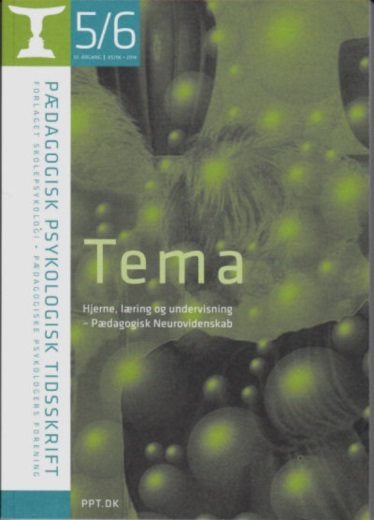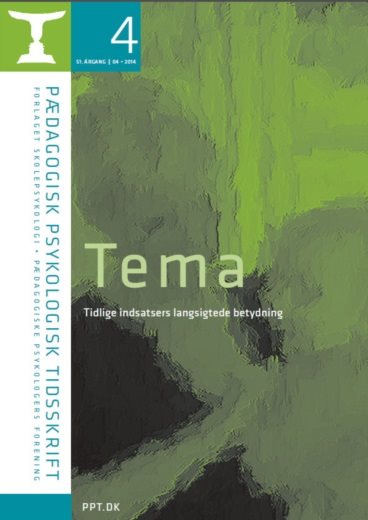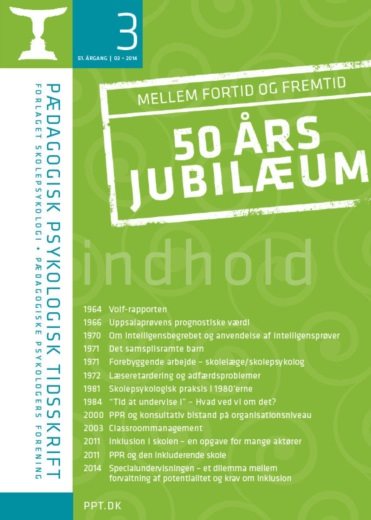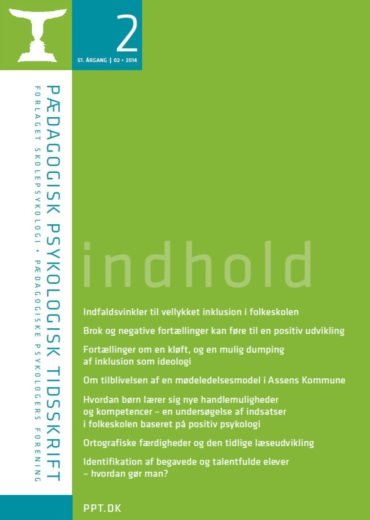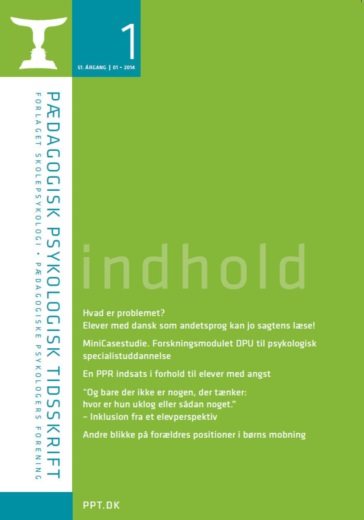Beskrivelse
Steffensen, Bo & Ejersbo; Lisser, Rye (Consultant at the National Knowledge Center for Reading and lecturer at the University of Aarhus). Pedagogical Neuroscience, Pædagogisk Psykologisk Tidsskrift, 2014, Vol. 51, 5, 5 – 13. –
Educational neuroscience is research that bridges the rapid development of neuroscience, the advances in psychology, and the challenges in education. The interdisciplinary cooperation between these fields of investigation leads to a better understanding of learning, cognition, emotion and consciousness. It is an international well-known research field, which was introduced in Denmark 2007. There have been a lot of discussions about different issues and the complexity around using neuroscience in pedagogy, especially in the area of theory of science. Still, educational neuroscience addresses many facets of the immense challenges for education related to brain development as memory, learning language and reading, mathematics and dynamic modeling of learning and of development. The research in the area also includes genetic and socio cultural topics which supply each other. Furthermore educational neuroscience can offer a deep understanding of how the brain and mind work and with this knowledge rejects a long line of ‘neuromyths’, which are the pitfalls that arise when erroneous or unfounded bridges are made between neuroscience and education. – Bo Steffensen og Lisser Rye Ejersbo.
Steffensen, Bo (Consultant at the national Center for Reading. The Brain, Language and Reading. Pædagogisk PsykologiskTidsskrift, 2014, Vol. 51, 5, 14 – 26. – Educational neuroscience makes it possible to understand how children learn to speak and read their mother tongue. This article gives a description of how different languages pose different challenges to the brain by this acquisition. It implies that the sound structure and orthography in Danish make it difficult to learn to read Danish. – Bo Steffensen.
Sunde; Pernille, Bødtker & Ejersbo; Lisser, Rye (The University of Aarhus). The teaching of Mathematics in an Educational Neuro Scientific Perspective. Pædagogisk Psykologisk Tidsskrift, 2014, Vol. 51, 5, 27 – 38. – In this article we outline some of the neuro scientific bases for the development of mathematical skills and comprehension. Understanding numbers is crucial for a child’s development in mathematics. Number understanding consists of two comprehension systems: number sense and number knowledge. Number sense is an intuitive and innate sense of the magnitude and relations of numbers. The Number sense, which we share with many animals, is linked to making biologically economic decisions such as optimal foraging. Number knowledge is an explicit understanding of number words and symbols, knowing their cardinal value and exact magnitude. Difficulties in mathematics may often be associated with limitations in number sense and number knowledge. Therefore, when teaching math one should be aware that both the intuitive number sense and explicit number knowledge are important to ‘nurse’. – Pernille Bødtker Sunde og Lisser Rye Ejersbo.
Price, Gavin, R & Ansari, Daniel (Western University, Canada and Vanderbilt University, USA). Developmental Dyscalculia: Characteristics, Causes and Treatments. Pædagogisk Psykolgisk Tidsskrift, 2014, Vol. 51, 5, 39 – 52. – Two types of developmental dyscalculia are introduced: primary d.d. which seems to be a developmental learning disorder that undermines the ability to process basic numerical magnitude information, and secondary d.d. which refers to mathematical deficits stemming from external factors such as poor teaching, low socio-economical status, and behavior problems etc. Recent years have seen a growing body of evidence supporting the characterization of primary d.d.; however, attempts to intervene educationally based on this understanding haven’t yet proved successful. – Bjørn Glæsel.
Schilhab, Theresa (Lecturer at the University of Aarhus). Neural Bottom-up and Top-down Processes in Learning and Teaching. Pædagogisk Psykologisk Tidsskrift, 2014, Vol. 51, 5, 53 – 64. – In learning the neural correlate is typically quite heterogenous and made up of numerous sub processes. Simultaneously senso- motoric and linguistic processes are co-active and thereby establish a neural aggregate that sustains the activity in memory. The heterogeneity may lend itself to operationalisations that prove educationally useful since they allow educators to exploit sub processes to facilitate the activity of the full circuit and thus improve learning. It is argued that manipulation of directed attention through language and metaphor use towards phenomenal qualities resulting in ‘derived embodiment’ may be especially productive. – Theresa Schilhab.
Nørby, Simon (Lecturer at the University of Aarhus). Profitable Learning: Three factors Facilitating Long Term Memory. Pædagogisk Psykologisk Tidsskrift, 2014, Vol. 51, 5, 65 – 77. – Which conditions facilitate learning and long-term memory? This article reflects on the importance of three factors that are crucial for long-term retention, namely elaborate encoding, spaced study and practice testing. Firstly, elaborate encoding involves thinking about the meaning and implications of some to-be-learned material. Secondly, spacing means letting time pass between study sessions. Thirdly, practice testing involves reactivating learners’ knowledge and implicates retrieving previously encoded information. An abundant amount of research has demonstrated that these three factors are very important for learning and long-term memory. Yet, they are often not seriously considered in educational practices or used for optimizing instruction. It is proposed that considering these factors may greatly improve knowledge acquisition and long-term retention. – Simon Nørby
Ringsmose, Charlotte (Professor at the University of Aarhus). Teaching or Learning? Pædagogisk Psykologisk Tidsskrift, 2014, Vol. 51, 5, 78 – 88. – This article views early learning according to brain based theory, and the impact of the environment on young children’s learning. It questions the focus on early education and stresses the importance of learning through participation, and children’s engagement in the learning process. High quality environments are important for brain development. According to cognitive developmental psychology the teaching approach is not age appropriate for young children. Learning through social relations rather than teaching is emphasized for children at a young age. – Charlotte Ringsmose.
Bøttcher, Louise; Falkenstrøm, Berit & Nielsen; Lone, Bryder (The University of Aarhus and Tværfagligt Center for børn og Unge, Vejle). Cognitive Assessment of Children With Cerebral Palsy as Foundation for Inclusion at School Age. Pædagogisk Psykologisk Tidsskrift, 2014, Vol. 51, 5, 89 – 102. – Children with special educational needs are increasingly being included in mainstream classes. One group is children with cerebral palsy (CP). This article describes a research project that investigated three practices for neuropsychological assessment and the extent of which results were employed in decisions about school placement and in the teacher’s support of the child. Three models for assessments were examined; (1) assessment by the municipal educational psychologist, (2) A one-week developmental assessment at the regional hospital by psychologists and pedagogues and (3) assessment by a specialized child neuropsychologist from a national team (VISO). Results showed that assessments from the national team and the regional hospital were the most comprehensive, but translation of the results into the child’s schooling depended on the child’s parents. Assessment from the municipal educational psychologist was less thorough, but the local anchorage eased the translation of the assessment into teacher awareness of the child’s special educational needs in general and knowledge and ideas for tailoring of everyday learning conditions. – Louise Bøttcher, Berit Falkenstrøm og Lone Bryder.
Jeppesen, Ulrik (Candidate of Psychology). An Independent and Meaningful Life – For Adults With Acquired Brain Damage and Anterograde Amnesia. Pædagogisk Psykologisk Tidsskrift, 2014, Vol. %1, 5, 103 – 115. – The article is based on the author’s thesis. The thesis challenges the predominant Danish ideas of intervention. These ideas are either centered on improving the memory function itself – or centered on the impact of abstract, environmental factors. The thesis argues that intervention, as well as assessment, has to be centered on the dialectical relationship between the amnesic’s memory functions, his participation in practice – and the concrete arrangement of the practice, he is participating in.
The article outlines the author’s work on constructing a theoretical, analytical and methodical concept for assessment that is consistent with the dialectical perspective and operationalises the idea of the Danish White Book of Rehabilitation on “an independent and meaningful life”. The application of the concept is illustrated with analytical excerpts from the empirical study of the thesis. By analyzing the severely amnesic person Poul’s participation in two different contexts, the author develops a theory about the difference between “new” and “old” action contexts. On the basis of the empirical findings, the author suggests that organizing old action contexts for the amnesic person is a relevant aspect of intervention. – Ulrik Jeppesen.
Ejersbo; Lisser, Rye (Lecturer at the University of Aarhus). Intuition. Pædagogisk Psykologisk Tidsskrift, 2014, Vol. 51, 5 116 – 130. – Intuition is a well known concept which is typically seen as the opposite of analytical thinking. Many researchers agree that the Dual Process Theory gives valid answers to most questions about the concept. Intuition is created by mental models that we build, and they appear as automatic responses in situations where a choice has to be made. Some examples are given, showing intuition to be helpful – or in some cases to be a hindrance. Intuition may lead to wrong answers e.g. in situations when a task has been primed or Interfered with. – Bjørn Glæsel.
